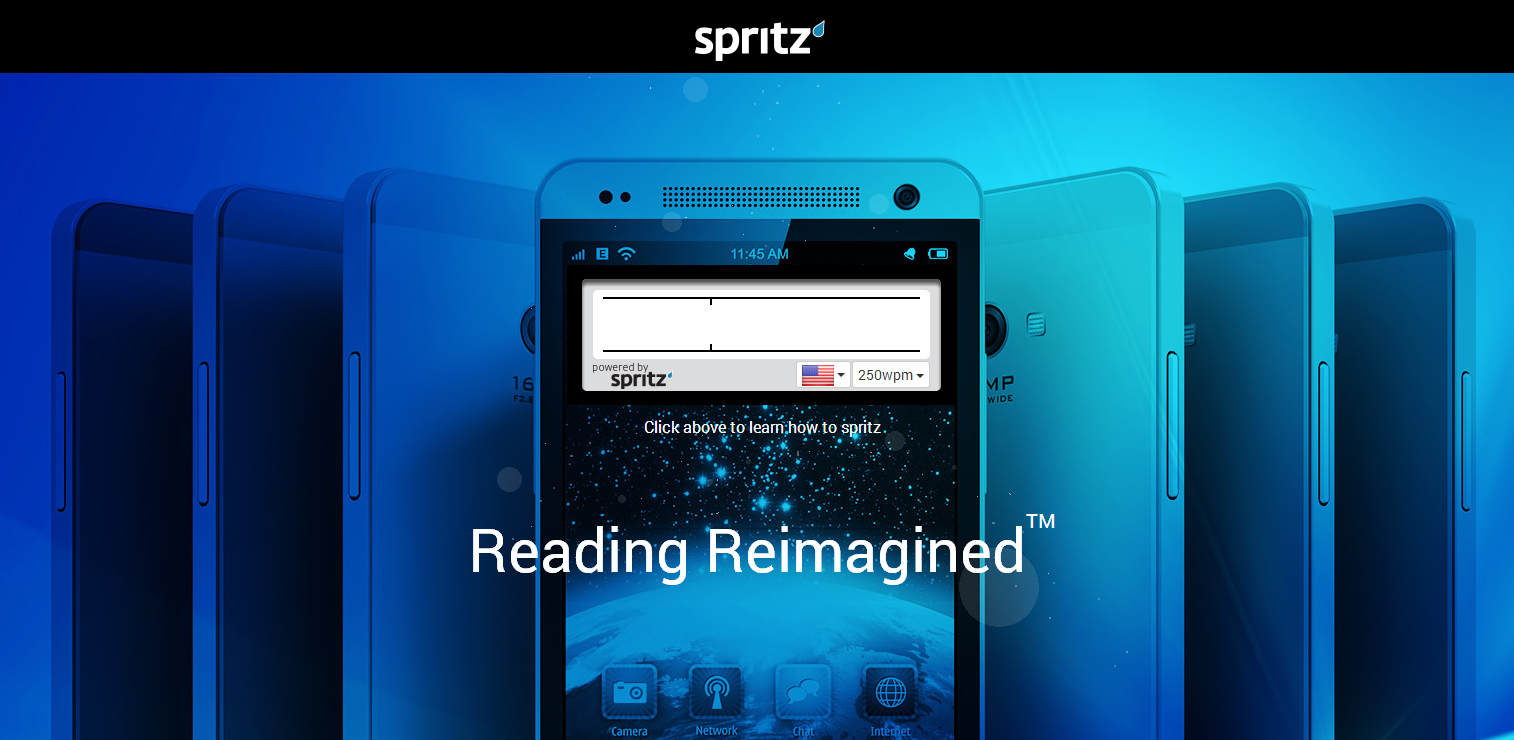
Spritzing helps you speed read, no lessons required
If you’ve been paying attention to the tech world recently, then you’ve probably heard about Spritz, an exciting new speed-reading technology with massive ambitions. The folks at Spritz want to change the way that everyone reads, well, everything.
Their technology is pretty simple.
Step 1: Set your reading speed anywhere from 100-1000 words per minute.
Step 2: Stare at the “Optimal Recognition Point” in a small box called a “redicle” on your phone, computer, tablet, smartwatch, house arrest anklet, etc.
Step 3: Continue staring as hundreds of words per minute individually fly by your eyes, and reap the benefits of faster reading AND greater retention.
![]()
The science behind Spritz is equally straightforward. When reading, the eyes move from word to word, searching for each word’s “Optimal Recognition Point;” a point in every word that is located slightly to the left, and causes the brain to begin processing the meaning of the word.
When the eyes reach punctuation, the brain processes the meaning of the sentence as a whole. Fully 80% of the time you spend reading is searching for the ORP, while the remaining 20% is spent processing the meaning of what you’ve read. In other words, the movement of the eyes substantially holds back the brain’s potential.
Spritz positions every word in a way that takes eye movement out of the equation, allowing for much faster reading speeds and equal if not greater retention without any special training.
For obvious reasons, Spritz is getting a ton of hype in the news and in social media, hailing it as “the future of reading.” In the Spritz FAQs, they list several types of tech that they think could benefit from their product.
In an effort to figure out where Spritz will actually fit into the tech world, and if it is “the future of reading,” I’ve broken down how I imagine Spritz would work in each of these different areas.
1. Digital Books
After my first Spritz demo, I immediately thought about how I would never spritz a novel. Even at 600wpm, Spritz made my inner reading voice unbearably unnatural, and sound like a choppier and more robotic version of Siri. In the Spritz FAQs, they suggest quietly humming to cancel out your inner monologue, allowing yourself to read faster.
But why would I want to mute my inner voice or speed read my favorite novels?
I’ve talked to a few Spritz fans about this, and we’ve all agreed – we couldn’t enjoy spritzing a novel. Punctuation, sentence length, and general rhythm are the tools that the author uses to shape the reading experience. The author is a director, and the text is his movie. Speed up a suspenseful movie to 1.5x the normal speed and tell me if it’s the same experience. You’ll know what happened in the movie, but you won’t have experienced it like the director intended.
Read the following climax to a suspenseful novel, and then imagine you’d spritzed it:
The thief saw the flashing red and blue lights of the police car in his driveway as soon as he’d turned onto the street. Pulling into the driveway, he noticed that his front door was open, and that the police car was empty. He cautiously walked up to the door with his hand on his gun. Nervously, he peeked his head through the open door. The living room was empty. The house was quiet. Seeing no one, the thief slowly walked up the stairs. Right foot. Left foot. Right foot. Suddenly, the third stair creaked loudly and a voice from the top of the stairs shouted, “FREEZE!”
In the above passage, the author attempts to create a visual in the reader’s mind, as well as a feeling of suspense. Spritz’s artificial pace would speed through this scene, not allowing the reader to truly experience it. If you were to spritz this passage, you would know that the thief showed up at his house, saw a cop car, walked up some stairs, and was shouted at by an unknown voice. You would know these things; you wouldn’t have experienced them as a movie in your head like the author intended.
The above example demonstrates only one type of fiction. But I can’t imagine that Spritz would lend itself well to a satirical piece, or a novel that’s meant to be laugh-out-loud funny. Nor do I believe that Spritz would be ideal for creating any kind of visual world in the mind, effectively ruining any type of novel that isn’t written in Dan Brown’s uber-“factual” style. In my opinion, Spritz moves too quickly and replaces the reader’s imagination and interpretation with a cliff note-like summary, or Spritz distorts the reader’s natural subvocalization through its artificial reading speed. As an avid reader, Spritz offers me no added benefits, but takes away important subjective aspects of my reading experience.
As for non-fiction, informational texts, and news, I think Spritz could be an ideal medium. If I could easily spritz long news articles like I can any of the pages on the Spritz website, I would never fall behind on what’s going on in even the most remote corners of the world. At some point, I think most people have gotten sucked into Wikipedia and spent time going from article to article — imagine how much general knowledge a person could quickly learn via Spritz and Wikipedia.
2. Email
Is your business limited by the number of emails it receives on a daily basis? Spritz could greatly increase the productivity of the individual worker in businesses that struggle to keep up with overflowing inboxes. Rather than skimming emails and then going back to reread the crucial parts, your employees could quickly read the entirety of an email and retain more through Spritz. I believe Spritz could save time and painlessly increase productivity for most businesses in the digital age.
I think it’s completely subjective whether or not one chooses to spritz their personal emails. As I said with digital books, for me, Spritz takes the personality out of the text. My personal email is full of things I want to read and things I don’t want to read. If an email is something I want to read, then I’m not going to spritz it to save a few seconds. If an email is something I don’t want to read, then I’m simply not going to read it. I’m not going to suddenly start reading all of the ads, newsletters, and various emails that clutter my inbox just because Spritz lets me do it faster.
3. Social Media
The Spritz developers ask, “Twitter and Facebook would be great with Spritz, wouldn’t they?”
“No, and no,” I answer.
I scroll past the majority of posts in my Facebook Newsfeed and Twitter Feed. I simply do not want to read most of the inane things that people post to social media. I have absolutely no interest in spritzing my newsfeeds.
Even in a perfect world where my Facebook friends and the people I follow on Twitter post amazing content 24/7, I don’t need to race through my newsfeeds any faster than my brain already allows me. The option of right clicking to spritz a post that I want to read seems unnecessary. Do I really need to be able to read a 140-character tweet at a speed of 1000 words per minute?
4. Closed Captioning
“Ever been to a sports bar with 100 televisions? Wouldn’t it be great if you could follow along with your favorite game with no volume and spritz the comments real time as the announcers make them? We think it would be pretty cool too.”
Unless I missed something, I believe you have to be continually staring directly at the “redicle” to reap the benefits of Spritz. I’ve seen some GIFs of Spritz being demoed on various devices, and I couldn’t make sense of what I was reading because I started paying attention midway through the sentence. Closed captioning is helpful because I can be watching the game, turn away to trash talk a friend about his team, and then easily catch up when I turn back around because of closed captioning’s fragmented and slow-scrolling nature.
Or, let’s say the referees are reviewing a play, and the network is showing a replay. I can focus on the video replay, and then read what the announcer said because the closed captioning is always a sentence or so behind. If you were to replace closed captioning with a real time Spritz feed, it would be harder to watch both the replay and read what the announcers say because of Spritz’s speed and one-word-at-a-time format. You can read closed captions without concentrating too much on the scrolling captions. Spritzing requires direct attention; good luck watching the big game surrounded by obnoxious and drunken fans at a sports bar!
However, I think Spritz has great potential as a replacement for closed captioning for the deaf and hard of hearing community, as well as a replacement for the news ticker. In both of these cases, the viewer is concentrating more directly on the words, making Spritz a more logical next step than in the sports bar example.
5. Embedded Media
“Think about maps, photos, and videos with spritzing directly embedded inside of the media.”
This is an awesome idea. I imagine adding Spritz “redicles” above the pins that mark my travels on a world map. Spritz “redicles” could supplement captions that already exist. For example, in every online news article, there is a picture at the top that has a caption that says who or what is pictured. Embedding Spritz into these pictures would allow journalists and editors to add specific quotes directly into these pictures while using the already existing caption for general context.
I’m not exactly sure how one would use Spritz directly in a video, but that doesn’t mean someone won’t figure out a way. Pop-Up video of the 21st century?
6. Smartphones & SMS
“Oh yes. And, you can read your notifications or app updates without even opening the underlying application if you don’t want to.”
I wouldn’t be surprised if my next smartphone came preloaded with the option to spritz my text messages, news alerts, and other push notifications. However, I already disable push notifications on the majority of my apps that aren’t messaging or news related. I don’t believe it’s imperative that I immediately notice every time someone tweets at me. Nor do I ever want to receive notifications from a random app that I downloaded to burn a few hours in the Atlanta Airport. The notifications that I do receive are at most two sentences long. Do I really need Spritz for that?
I can’t imagine myself using the Spritz feature on my next smartphone very often, but that doesn’t mean that someone else won’t prefer it. I’m already a fast reader and tech-savvy, so notifications are a non-issue for me. If opening and reading a text or news alert is a hassle for you, then Spritz might be what the doctor ordered.
7. Wearable Tech
At the moment, I haven’t bought a smartwatch because I think the early models are sort of gimmicky. Yes, some of them can take pictures, make phone calls, use a variety of apps, track fitness, and receive notifications from the owner’s phone. But, I already have a $300 phone in my pocket that does most, if not all of these features better. People glance at their traditional watches to tell time; I don’t want to awkwardly stare at my smartwatch and press the side-buttons ten times just to read a single email. It’s doesn’t seem convenient to do any task that involves reading on a small screen.
Spritz will change all that.
Don’t want to stare at your smartwatch and press the buttons several times just to check your email? Well, now you can quickly and comfortably spritz an entire email, text, or notification. I believe that Spritz is the technology that will make the next smartwatches efficient and convenient to own. If wearable tech is going to be the next big trend, then we should expect smaller screens that aren’t ideal for most reading based uses. Spritz could be the major innovation that the industry needs to continue moving in this direction.
Final Thoughts
Spritz is an impressive project, and I believe it will successfully find its niche in future technologies. There are tons of speed-reading techniques, but Spritz seems like they’ve done their homework, and truly separated themselves from past methods. I can’t imagine that I’d use Spritz very often if my current phone, tablet, or laptop had the capability. But if I decide to buy a smartwatch, you can bet I’m going to choose the option that comes with Spritz. Unsurprisingly, Samsung has decided to include Spritz technology on the Samsung GS5 phone and Galaxy Gear 2 smartwatch. Depending on how their experiment with the technology goes, I wouldn’t be surprised if the option to spritz started showing up everywhere.
So is Spritz “the future of reading?” Maybe, maybe not. Traditional reading won’t become equivalent to hieroglyphs just because Spritz has entered the mainstream. Though we live in a world where time is money and Spritz can definitely save time, I can’t see spritzing becoming the universally preferred option for most types of reading. However, I think many businesses will successfully experiment with Spritz’s inherent power to save time and increase productivity. Also, I think Spritz could be the missing piece of the puzzle in the wearable tech trend that takes products that could be considered gimmicks, and makes them functional and practical pieces of daily life.
Now that Spritz has “come out of hiding,” it’s going to start spreading quickly and evolving beyond these original areas in ways no one has yet anticipated. I’d be shocked if someone doesn’t come up with a way to use Spritz for advertising in the next six months. Only time will tell what the future holds in store for Spritz, and I’m excited to see what Spritz’s future holds in store for us.
Ryan Kane is a Senior at Duke University and a Brand Ambassador for Snaps, a social media startup. He's currently searching for post-graduation employment in the tech industry, and plans on working in the world of apps and social media. Check out his LinkedIn to learn more about him or follow him on Twitter to keep up with his musings on the latest news in technology.








































Tinu
March 26, 2014 at 6:52 pm
What speed reading is truly needs to be communicated before people try to build things around achieving that end. Speed reading is NOT supposed to involve your inner voice. It’s meant to be the ability to look at a group of text and make your brain process that text without sub-vocalization, or your inner voice.
For some people, this might ruin things like novels IF they don’t know to drop their sub-vocalization, or what happens when they do. When I speed read a novel, I enjoy the novel More, because I’m absorbing it almost like I would going to see a play. I don’t sound out the words I”m reading in my head because the picture of what I’m reading comes about much faster.
On the other hand, if I’m reading someone who is particularly skilled at wordplay, or writes poetically, like Faulkner or Morrison, If I’m reading FOR the pleasure of sub-vocalization, I simply don’t speed read. You can turn it off.
But if you do any kind of research, or constantly have to read technical text or the news, you can get through all of that so much faster if you learn to speed read the way it’s traditionally taught.
Thanks for the great article.
Brian D. Meeks
April 3, 2014 at 2:40 pm
Fantastic article.
For me, I agree that I wouldn’t use it to read novels…with one exception, my own.
I’m a novelist and the last read through (after the editor, beta readers, and Mom and Dad) can be painful and often unproductive. I’m just too darn familiar with the words that are supposed to be there to catch if I’ve mistakenly used site for sight.
This tool might be a great tool for finding those hidden errors that don’t jump off the page.